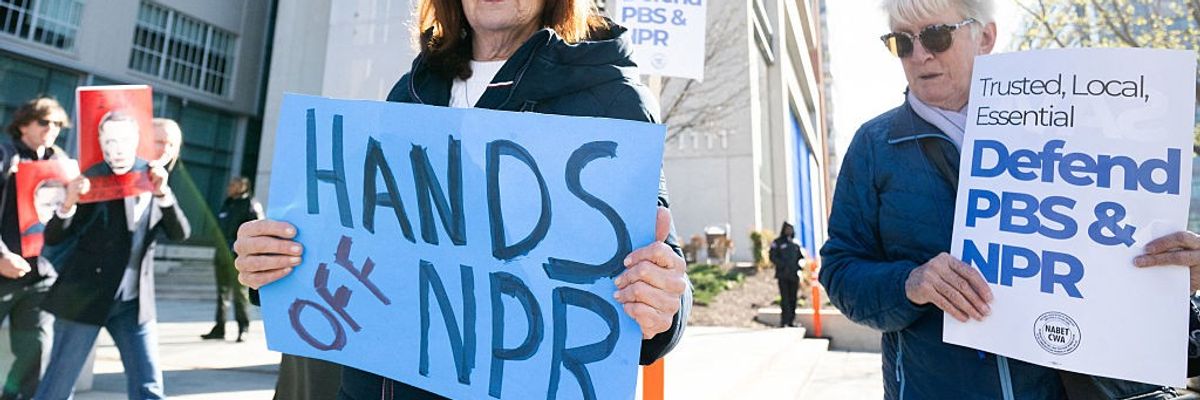Jake Johnson
"All
of us who care about an independent press, an informed populace, a responsive
government, and a thriving democracy have a stake in the outcome of this
fight," said one press freedom advocate.
 Demonstrators urge Congress to protect funding for NPR and PBS in Washington, D.C. on March 26, 2025. (Photo: Saul Loeb/AFP via Getty Images)
Demonstrators urge Congress to protect funding for NPR and PBS in Washington, D.C. on March 26, 2025. (Photo: Saul Loeb/AFP via Getty Images)
U.S. President
Donald Trump on Thursday signed an executive order calling for an end to
taxpayer funding for NPR and PBS, an escalation of his dangerous assault on
public media that could shutter hundreds of local stations across the country.
The president's
order, which he signed behind closed doors, echoes a section of Project 2025, a
far-right agenda that called for stripping public funding from NPR, PBS, and
other broadcasters on the grounds that they "do not even bother to run
programming that would attract conservatives."
Trump's order
instructs the Corporation for Public Broadcasting (CPB)—a private nonprofit
corporation created and funded by Congress—to "cease direct funding to NPR
and PBS, consistent with my administration's policy to ensure that federal
funding does not support biased and partisan news coverage."
The executive
order, which is expected to face legal challenges, also directs all federal
agencies to "identify and terminate, to the maximum extent consistent with
applicable law, any direct or indirect funding of NPR and PBS."
Craig Aaron,
co-CEO of the advocacy group Free Press, said in a statement Friday that
"Trump's attack on public media shows why our democracy is on life
support."
"After
years of attacking journalists and lying about their work, it's no surprise
that Trump and his minions are trying to silence and shutter any newsroom that
dares to ask him questions or show the devastating impact of his policies on
local communities," said Aaron. "Yet in many of those communities,
the local public-media station is the only source of independent reporting.
Trump, of course, prefers fawning propaganda—which too many commercial TV and
radio broadcasters are willing to provide in exchange for regulatory favors, or
to stay off the president's target list."
"All of us
who care about an independent press, an informed populace, a responsive
government, and a thriving democracy have a stake in the outcome of this
fight," he added. "If we unite to defend public media—and I believe
we can and will prevail—then we might just save our democracy, too."dele'
Trump's move
was expected, and it came in the wake of reports that the administration
intends to ask Congress to rescind previously approved funding for CPB, which
is already engaged in a court fight with the president over his attempt to fire
several of the organization's board members. The Associated Pressreported
Thursday that the rescission request "has not yet been sent to Capitol
Hill."
According to
the organizations' estimates, federal funding accounts for roughly 1% of NPR's
annual budget and 15% of PBS's yearly revenue.
In a letter to
congressional leaders earlier this week, a coalition of civil society groups
led by Reporters Without Borders (RSF) warned that, if enacted, Trump's
proposed funding cuts for public broadcasting "will result in the shutdown
of dozens, if not hundreds, of local, independent radio and television stations
serving Americans in every corner of the country."
"As it
stands, public media journalists are often the only reporters attending a
school board meeting, or a local zoning hearing, or at the scene of a
crime," the groups wrote. "They are the journalists most likely to
hold local public officials accountable and expose
corruption.
Faraway digital media outlets will not replicate this coverage, and the
American public will lose out."
Trump's attack
on public broadcasters is part of his administration's broader effort to
undermine journalism in the United States and around the world.
RSF said in a
report published Friday that Trump's "early moves in his second mandate to
politicize the Federal Communications Commission (FCC), ban The Associated
Press from the White House, or dismantle the U.S. Agency for Global Media, for
example, have jeopardized the country's news outlets and indicate that he
intends to follow through on his threats, setting up a potential crisis for
American journalism."
"After a
century of gradual expansion of press rights in the United States," the
group said, "the country is experiencing its first significant and
prolonged decline in press freedom in modern history, and Donald Trump's return
to the presidency is greatly exacerbating the situation."

No comments:
Post a Comment